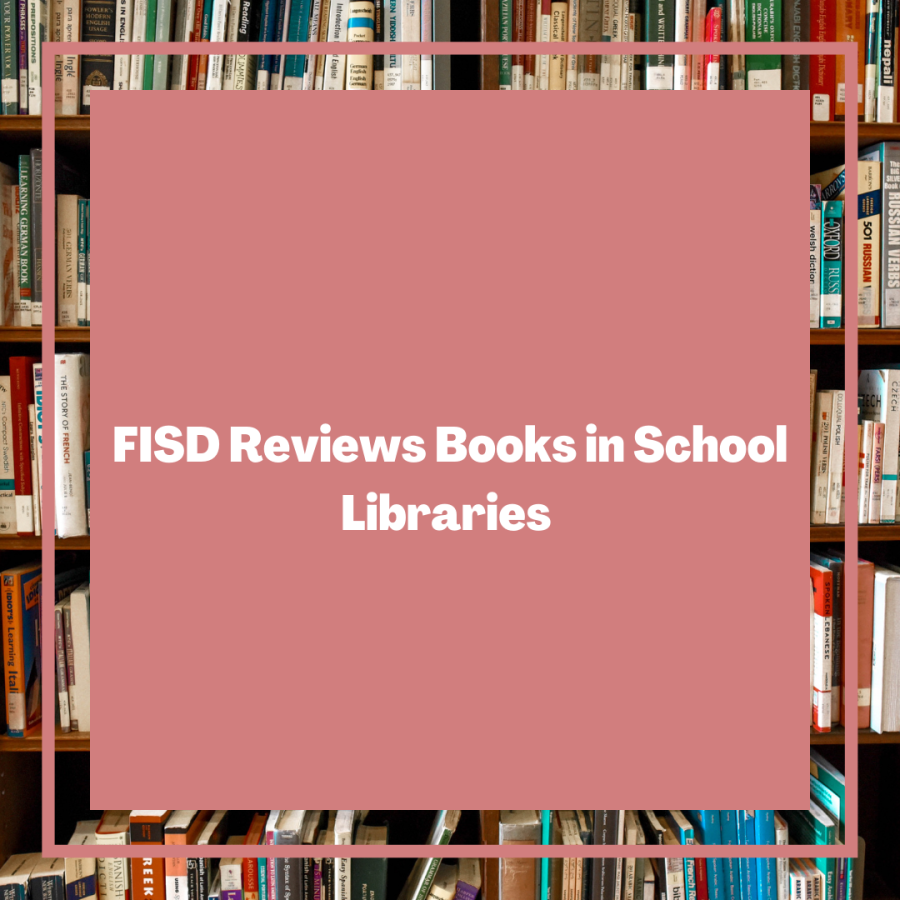FISD Reviews Books in School Libraries
May 18, 2022
The Fredericksburg Independent School District (FISD) school board voted on March 21 to review approximately 45 books deemed pervasively vulgar in FISD school libraries.
“We had a few concerned citizens that shared with us excerpts from the books and pages and really provided some level of detail and asked, ‘Are you aware?’” Superintendent Joe Rodriguez said. “They were able to provide specifics, titles of books, what schools they were located in, and they did a lot of their own research.”
The concerned citizens organized a list of 45 books that were originally labeled as pornographic; however, the board and the superintendent changed the term to “pervasively vulgar” as it is the correct terminology that is used in the EF Legal Board Policy.
“There was a group of books that were considered as priority because of what the (concerned citizens) considered being pornographic. We didn’t necessarily use that term,” Rodriguez said. “We looked at our policies that guide the decision making when we come across a concern that a parent or student has or any type of community member or an employee.”
To provide clarity to the community, the superintendent and the school board took some of the language out of the legal policy and placed it into the local policy so that both policies supported the review of these books. This allowed the school district to begin the process of reviewing library resources that had paperwork filed for a request for reconsideration.
“We clarified local policy by grabbing language from legal, and we added a window of time of five days for the principal to review, just to do a background review,” Rodriguez said. “We gave the committee a 30-day window to make a final decision.”
A committee of parents, FISD staff and community members was organized to review the list of books. Due to a lack of clarity in the policy, students, regardless of age, were not allowed to be a part of the committee review.
“There is now a form for parents or community members to fill out, and then the process would start with the 30 days for the committee,” FISD Assistant Superintendent of Curriculum Robyn Derington said. “Our policy does not list students. So that’s not something that we could do.”
A committee review is needed to clarify what makes each book on the list pervasively vulgar. The committee will review each book and vote to decide if the entire book is pervasively vulgar and needs to be removed or if the book can be put back onto the shelves.
“The committee will review the entire book, not read the entire book, but review the entire book and look at it as a whole. Then the committee can make a recommendation that the book is inappropriate for certain ages, and it needs to be removed completely,” Derington said. “It might be if the book was in middle school, they may look at that and say, ‘we recommend that this book be moved from the middle school to the high school.’ They can make any kind of recommendation like that. So the committee makes the recommendation, and then they give the copy of the recommendation to the superintendent, to myself, and to the principal.”
The board and superintendents did discuss allowing students to check out these books with parental consent forms and a summary of the book. However, they decided that pulling books off the shelves and reviewing them would be the easiest solution.
“We only have one certified librarian in the entire district, and our other campuses have paraprofessionals. So we have to consider what is taxing on our staff,” Derington said. “I think it would be very hard to manage that.”
“And even some of the parents shared with us that even when you pull up the summary, the summary doesn’t identify if it’s pervasively vulgar,” Rodriguez said. “Once you began reading, that’s where you found, and you identified what would be considered pervasively vulgar or not suitable for students.”
At the high school level, some students are 18 years old. Although these students are legally adults, there are some adult aspects that Rodriguez states that may be too inappropriate to have on school grounds .
“We’ve actually talked about whether we need to create a second section of the library for those that are 18 years old and older,” Rodriguez said. “You’re about to venture off into a whole other chapter in your life once you’re 18 years old, but we also know that parent involvement is going to be important for someone that’s still 18 and a student in our school district. So there are still some limitations, even though you are of age, because it’s a school setting.”
A parental consent form for AP English classes may be required in the future for the three AP books on the list. The AP College Board has stated it will pull AP programs from schools that are removing books that are on the AP list from their libraries. Since three AP books are on the FISD review list, the superintendents believe this form will be a way to avoid any AP program repercussions.
“So with these three books, I will make sure that the committee understands that those are on the AP list. So let’s say that they read it, and they say that it needs to be removed,” Derington said. “What we can do as a district, if that’s part of an AP class, then when those books are being used in an AP course, we can get parental permission. If a parent says that their student can’t read that book, then we would give an alternative assignment.”
Of these 45 books on the list, three have been purchased in the last two school years.
“I worked with our district certified librarian, Ms. Abbey-Duncan, and we put a chart together that says, when the book was actually purchased and put into our library, when was the last time it was checked out,” Derington said. “Most of them have been in the library for a long time. One was purchased in 2020, and two were in 2021. Some of the books hadn’t been checked out since 2014. One of the books has actually been in our library since 1986.”
The committee of 24 community members, parents, and school staff will decide by the beginning of the next school year which books on the list will be removed from the library shelves and which ones will be returned for students to check out.




































